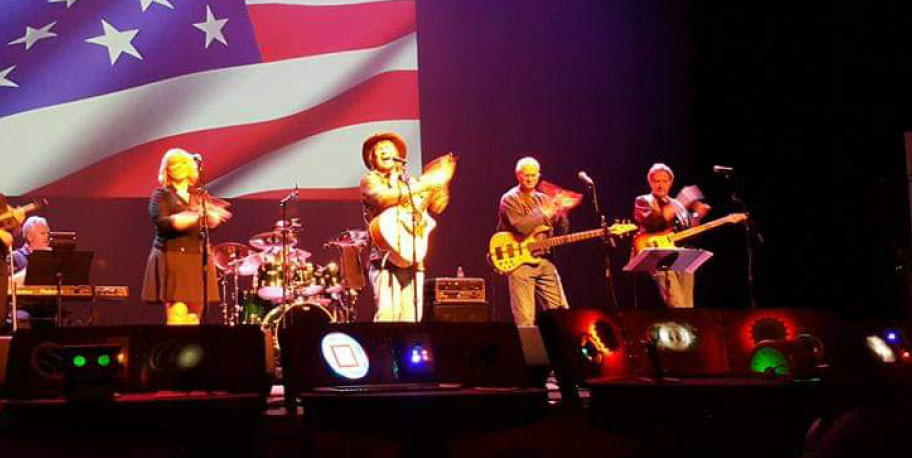By Matt Skoufalos

Kile Jackson first picked up a musical instrument as a fourth-grader.
Biomed and service technician Kile Jackson’s health care career has included long runs with companies from GE to Modern Medical Systems (now Crothall Healthcare Technology Solutions), and most recently, Summit Imaging of Woodinville, Washington, where he serves as a customer service engineer. But setting aside the nearly 50 years he’s spent in the medical field, Jackson has enjoyed an even longer career as a professional musician.
Growing up on a small farm around Guthrie Center, Iowa, some 50 miles west of Des Moines, Jackson learned to turn a wrench on appliances just by hanging out with his dad, who worked as a Sears service manager. From fixing washers, dryers, and refrigerators, Jackson soon graduated to HVAC systems and televisions once his father’s colleagues realized he could handle himself at the tech bench. But long before then, it was a bout of childhood rheumatic fever that first set his facile hands to work on a musical instrument.
Confined to the family farm with the illness during his fourth-grade year, Jackson bought a Sears catalogue guitar with money sent from well-wishers. He learned to play by looking over his shoulder to see which chords Kenny Rogers or Paul Revere and the Raiders were picking out on television. By the time he got out of the hospital, his parents had decided to move into town proper, and his father continued Jackson’s musical education, driving the boy into Des Moines for weekly lessons at a local music store.
Jackson went from playing in high school bands to booking his own shows at clubs in the city, and his father graduated from wheelman to doorman, collecting money at the shows. Five or six nights a week in the Des Moines music scene, Jackson’s band, Hip Pocket — their name taken from Tower of Power’s 1973 hit “What is Hip?” — opened for touring country acts who later hired the players to be their own backing bands. As the Des Moines music scene developed through the 1970s and 1980s, Hip Pocket played hotel circuits, the downtown arts district, and even began recording jingles and radio ads.
Meanwhile, Jackson took a day job in insurance that eventually led him to a hospital setting, where he found a more fitting niche wrenching on medical equipment. When the droughts hit Iowa in the 1980s, he took a vacation to Seattle, and found a market where “there were jobs all over.” Not long after, Jackson moved to Washington for good, parlaying his experience as a hospital biomed into a gig with GE. The music scene there “was just flourishing,” he said, and Jackson was right in the thick of it, assembling a country band, The Rangers, that performed six and seven nights a week.
“We would do a live broadcast from the dancehall at The Riverside Inn in Tukwila, Washington, and we were one of the house bands there for seven years,” Jackson said. “We were voted Seattle’s best country dance band in 2001 and 2003. We catered to all that urban cowboy stuff, and then took that into the casino shows.”
When booking agents sought acts who could deliver 1950s music at large, seasonal car shows, Jackson formed The Edsels. When casinos were looking for Motown Top 40 acts, he formed The Hit Men; when wineries opened up to stripped-down performances, he formed a duo with his keyboardist and chief collaborator, Dave Cashin. In every incarnation, Jackson thrived because he was able to recruit and keep up with top-tier talent.

Kile Jackson has performed a wide variety of music over the years.
Cashin had played with bluesman Keb’ Mo’ in his early days. The Rangers’ drummer, John Agostino, performed with country musician Vince Gill for years. Guitarist John Morton was the musical director for Seattle circus dinner theater Teatro ZinZanni. When Jackson was diagnosed with Stage Four throat cancer at 53, he met Danish harmonica player Lee Oskar, who’d toured and recorded with the funk fusion act War; they eventually collaborated on some studio recordings. Heavy metal guitarist Michael Wilton from Queensryche, and Alan White, the drummer from prog-rock pioneers Yes, have also joined Jackson in the studio. Those connections wouldn’t have been made without his commitment to the craft of being a working musician.
“Music’s a love; it’s a passion,” Jackson said. “Life would be pretty boring without music. The camaraderie of mentally linking with a fellow musician – and it’s unspoken – there’s some of these players you play with, and the minute you’re onstage with, it’s magic. There’s nothing like igniting the soul when you’re playing with players who are just locked in.”
As a bassist and vocalist, Jackson has lived a life of working days in hospitals and playing shows at night, so much so that he’s seen the Washington music scene transition from bar gigs to casino gigs to winery shows, as tastes (and smoking laws) evolved. But nothing had so dramatic an impact on his career as the novel coronavirus (COVID-19) pandemic shutdown.
“Things just crashed immediately,” Jackson said. “I’ve lost well over 140 shows since COVID hit. We said, ‘I guess if we can’t play, we’ll just do studio recording.’ ”
That’s a far cry from the Seattle music scene of the 1990s, which Jackson can only describe as “insane,” as the modern country movement erupted alongside the mainstream following that emerged behind grunge rock.
“There was one year we did 36 shows a month and never played a Monday,” Jackson said. “We were going from small town to small town on crazy schedules. Back then we were carrying pedal steel guitars and line dancers at the big shows.”
Classic country is still his favorite musical genre to play, and Jackson has shared bills with some of its greats, including Willie Nelson, The Mavericks, Lonestar, Vince Gill, and the Gibson/Miller Band. Despite that impressive resume, Jackson’s quick to point out that he enjoys “everything from Norah Jones to Michael Bublé.”
“So many musicians get locked into one style of music and they never explore the other stuff,” he said.
Amidst it all, Jackson raised two sons who are also talented performers – although growing up with a living room given over to musical instruments and amplifiers, they never had to send away for a Sears catalogue guitar. Both still live close by; both still play, he said.
“It’s just been a musical family,” Jackson said. “We’ve all been smitten by music.”







